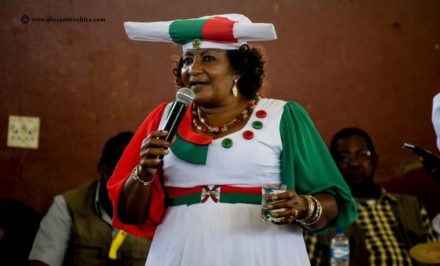 Wangari Muchiri, the Kenyan engineer committed to accelerating the ecological transition in Africa
Wangari Muchiri, the Kenyan engineer committed to accelerating the ecological transition in Africa
 Senegal: Oulimata Gueye, a curator specializing in digital technologies and arts
Senegal: Oulimata Gueye, a curator specializing in digital technologies and arts
 Susan Sagina Adongo : “At the heart of all my work is a passion for community-driven solutions”
Susan Sagina Adongo : “At the heart of all my work is a passion for community-driven solutions”
 In Kenya, Nzambi Matee turns plastic waste into bricks
In Kenya, Nzambi Matee turns plastic waste into bricks


Esther Utjiua Muinjangue, head of the NUDO opposition party in Namibia, is deputy minister of health. She was appointed on 24 March 2020. If she currently plays a key role in the response against Covid 19 in the country, she is best known for having drawn worldwide attention to the « forgotten » Namibian genocide of the Herero and Nama populations, dating back to one century.
Esther Muinjangue began her professional career as a social worker. She chose very early on, to follow a path that will set her apart. At a time when there were basically two professions for girls, nursing or teaching, she decided to go for social work. « I had zero clue what social work was all about, but I decided to go for it. I must say that there is no single moment I regret that I did social work », she says. She studied at the Academy for Tertiary Education (today the University of Namibia) and joined the public sector in 1987 as social worker. In 1996, she became a social work lecturer at the University, a position she held for more than 20 years.
Drawing attention to the Namibian genocide
While she was university lecturer, she also committed to the Herero and Nama communities. Her commitment to the heritage of both communities made her known to the Namibians and worldwide. As president of the Ovaherero Genocide Foundation (OGF), she criss-crossed national capitals to campaign for the Herero heritage. She also travelled across the world to raise international awareness on the « forgotten » Namibian genocide which dates back to the German colonial period, from 1904 to 1908, during which the Herero and Nama tribes had been hanged, raped, imprisoned, incarcatred, their bodies beheaded and the skulls were taken to Germany. As a Herero herself, she decided to break the silence on this massacre which remained unknown in history for years. As part of her commitment, she also requested for reparations from the German government to the two communities. « The Ovaherero genocide is considered the first genocide of the 20th century but it was least known compared to the Halaucust. I’m proud that I played a role in putting the genocide on the global map », she says. She played an important role in the repatriation of human remains from Germany back to Namibia. In 2018, she was part of the Namibian delegation that travelled to Berlin for the third repatriation of 19 human skulls.
From social work to politics
In August 2019, Esther Muinjangue decided to move into politics. After joining the National Organization for Democratic Unity (NUDO) earlier, she was elected in March 2019, president of the party during its third general assembly and became one of the rare women to lead a political party in Africa. As the leader of one of the country’s opposition parties, she ran for presidency during the last Namibian presidential elections in November 2019. She was the only woman among 10 candidates. Even if she did not win the elections, she obtained 17,000 votes and was among the top 5. « For me, it was not about becoming the president of the country but it was about emphasizing a point: that women are arriving and we are equally capable », she says. In March 2020, she was appointed by the President of Namibia as Deputy Minister of Health, and is thus part of the team responsible for managing the response to the coronavirus in the country.
In December 2019, Esther Muinjangue obtained her PhD from the Stellenbosch University in South Africa.